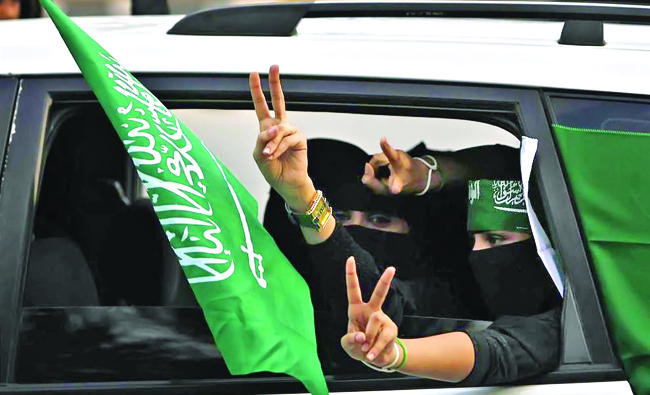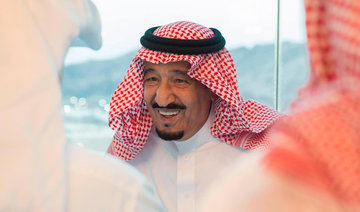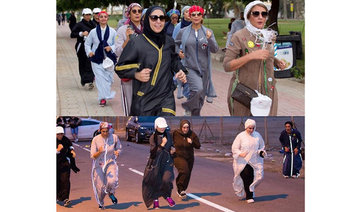JEDDAH: The US on Tuesday led an international welcome for Saudi Arabia’s decision to allow women to drive.
The historic move, ordered in a decree by King Salman, will see women get behind the wheel from June next year.
“We’re happy to hear that,” said US State Department spokeswoman Heather Nauert.
“It’s a great step in the right direction. We’re just happy today. A very positive sign,” she said.
The decree, issued on the state-run Saudi Press Agency, said women in Saudi Arabia would be able to obtain driving licenses and drive cars.
News of the decision became the top trending topic on Twitter, with many posts tagged #SaudiWomenCanDrive.
The decree referred to the “negative effects of not allowing women to drive vehicles, and the positive effects envisaged from allowing them to do so” within the context of Islamic law.
The decree also pointed to the fact that the majority of the Council of Senior Scholars agreed that women driving was not prohibited by religion, and therefore they did not oppose allowing them to drive in principle.
“The scholars see no reason not to allow women to drive as long as there are legal and regulatory guarantees to avoid the pretexts (that those against women driving had in mind), even if they are unlikely to happen,” said the decree.
The king instructed the Interior Ministry to apply traffic regulations, including the issuance of driving licenses, equally to both men and women.
The move was announced on television and also by the Saudi Ministry of Foreign Affairs, with the royal decree mandating the creation of a high-level committee of ministries (including the Interior Ministry, Finance Ministry and the Labor and Social Development Ministry) to study the necessary steps needed to implement the regulations.
“The committee must submit its recommendations within 30 days. The implementation — God willing — will be from Shawwal 10, 1439 (corresponding to June 24, 2018) and in accordance with rules and regulations, and the completion of the necessary steps,” said the decree.
In Washington, Saudi Ambassador Prince Khaled bin Salman described the decision as a huge step. “It’s not just a social change, it’s part of economic reform,” he said.
“Our leadership believes this is the right time to do this change because in Saudi we have a young, dynamic open society.”
The reaction within Saudi Arabia was swift and emotional.
“I am on top of the world,” Lina Almaeena, a Shoura Council member, told Arab News from Bern, Switzerland, where she is part of the official Shoura Council delegation to Switzerland.
“This historic decision and announcement is really going to make a difference in many, if not most, Saudi families. Economically, it is going to decrease the burden on families; socially it will be much better for women to have control over their lives, not always waiting for a man who is no relation to her; or being in a car alone with a stranger whose background she is not aware of.”
Almaeena said the decree allowing women to drive was part of Crown Prince Mohammed bin Salman’s Saudi Vision 2030. It was about women’s empowerment and equal opportunities for men and women, whether in the work force or anywhere else, she said.
“These things are all connected. Women can drive and even if they are not working, they can drive their families to work or their children to school. Fathers are not always available.”
Almaeena said there was a general expectation that Saudi women would be allowed to drive. “But were we expecting this decision tonight? No, this has come as a very pleasant surprise,” she said, thanking King Salman and Crown Prince Mohammed bin Salman.
Samia Al-Amoudi, a prominent businesswoman and breast cancer survivor in Jeddah, told Arab News: “The idea of women’s empowerment would have remained incomplete without allowing women to drive.
“I am happy that women are allowed to drive and that my daughter will be allowed to drive. This is a great day for Saudi Arabia.”
Italy’s Consul General Elisabetta Martini also welcomed the decision. “We want to congratulate all Saudi women on this opportunity given to them by the king. We wish them safe driving,” she told Arab News.
Amena Bakr, a Saudi energy analyst, said it was a “massive victory for women in the Kingdom.”
“Really about time,” she said.
The issue of women driving has been the subject of debate in Saudi Arabia for many years.
“The Kingdom’s leadership has determined — correctly — that the time has come for it to be resolved,” said Fahad Nazer, international fellow at the Washington-based National Council on US-Arab Relations.
“There is wide support for the decision among both Saudi women and men. The issue was never about religion or culture. It has always been about the readiness of Saudi society. It is a very important step in the right direction.”
‘A very positive sign’: congratulations pour in as Saudi women are finally allowed to drive
‘A very positive sign’: congratulations pour in as Saudi women are finally allowed to drive

Saudi Arabia condemns Israel’s Gaza electricity cut

RIYADH: Saudi Arabia has condemned Israel’s move to cut electricity to the Gaza Strip in what the Kingdom described as a practice of “collective punishment” against Palestinians in Gaza.
The Kingdom stressed its categorical rejection of Israeli violations of international humanitarian law, a foreign ministry statement said.
It reiterated its call on the international community to take urgent measures to restore electricity and the flow of aid to the Gaza Strip immediately without conditions or restrictions.
The Kingdom “renewed its call to activate international accountability mechanisms for these serious violations,” the statement concluded.
Israel cut off the electricity supply to Gaza, officials said Sunday, affecting a desalination plant producing drinking water for part of the arid territory.
It also suspended last week supplies of goods to the territory of more than 2 million Palestinians, an echo of the siege it imposed in the earliest days of the war.
Saudi Arabia welcomes Syrian agreement in northeast

RIYADH: Saudi Arabia welcomed an agreement between the interim Syrian government and Kurdish-led Syrian Democratic Forces that controls the country’s northeast.
The Kingdom praised the measures taken by the Syrian leadership to safeguard domestic peace in Syria and efforts made to complete the path of building state institutions, a Saudi foreign ministry statement said on Monday.
The deal includes a ceasefire and the merging of the main US-backed force there into the Syrian army.
The deal was signed by interim President Ahmad Al-Sharaa and Mazloum Abdi, the commander of the US-backed, Kurdish-led Syrian Democratic Forces.
The deal to be implemented by the end of the year would bring all border crossings with Iraq and Turkiye, airports and oil fields in the northeast under the central government’s control. Prisons where about 9,000 suspected members of the Daesh group are also expected to come under government control.
— With input from AP
Saudi crown prince, US Secretary of State discuss regional developments

- Rubio in Kingdom ahead of crucial talks with Ukraine aimed at ending conflict with Russia
RIYADH: Saudi Arabia’s Crown Prince Mohammed bin Salman received US Secretary of State Marco Rubio on Monday evening.
Rubio arrived in Saudi Arabia earlier on Monday ahead of crucial talks with Ukraine aimed at ending three years of conflict with Russia.
They reviewed relations between the two countries and opportunities to enhance and develop them in various fields, the Saudi Press Agency reported.
They also discussed the latest regional and international developments, exchanged views on them, as well as efforts made toward achieving security and stability, SPA added.
The reception was attended by Mike Waltz, US President Donald Trump’s national security advisor.
On the Saudi side, Prince Khalid bin Salman bin Abdulaziz, Minister of Defense and Saudi ambassador to Washington, Princess Reema bint Bandar, were also in attendance.
The top US diplomat is in Jeddah ahead of the talks with Ukrainian officials expected on Tuesday, leading a delegation that also includes Waltz.
Ukrainian President Volodymyr Zelensky also arrived in the Kingdom on Monday.
Pakistani community hosts large iftar gathering in Jeddah

- The iftar table featured a variety of traditional Pakistani dishes, including pakoras, samosas, haleem, and dahi bhalla, alongside Rooh Afza, a drink often enjoyed during Ramadan
JEDDAH: The Pakistani community in Jeddah organized its annual iftar gathering this week, bringing together a large number of residents along with representatives from the Pakistani Consulate.
The initiative strengthens community ties, upholds the shared values of Ramadan, and enhances the spiritual essence of the holy month, Saudi Press Agency reported, with heartwarming scenes of unity, brotherhood, and camaraderie among attendees.
The iftar table featured a variety of traditional Pakistani dishes, including pakoras, samosas, haleem, and dahi bhalla, alongside Rooh Afza, a drink often enjoyed during Ramadan. Traditional sweets, symbolizing Pakistani hospitality, were also part of the feast.

Guests embraced their cultural heritage by wearing traditional Pakistani attire. Men donned the shalwar kameez, a customary outfit for religious and social occasions, while women wore vibrant, intricately embroidered garments, adding a cultural charm that reflected their pride in their traditions.
Muhammad Irfan, press counselor at the Pakistani Consulate, highlighted the significance of such gatherings in fostering unity and strengthening the bond among community members.
He expressed his joy at witnessing the spirit of brotherhood and solidarity that Ramadan promotes.

“As you see, Pakistan has a huge community in Jeddah and the western region,” he told SPA. “Saudi Arabia is a second home for all of us.”
He emphasized how celebrating Ramadan in Saudi Arabia brings an added spiritual experience: “It just feels like home. So we don't feel much of a difference, rather it brings a more elevated spiritual experience, especially being close to the Haram.”
His wife, Rubina Irfan, also spoke about the communal aspect of Ramadan in the Kingdom.
We prepare for Ramadan here the same way we do in Pakistan. As a community, Ramadan is really enjoyable in Saudi Arabia.
Rubina Irfan
“We prepare for Ramadan here the same way we do in Pakistan. As a community, Ramadan is really enjoyable in Saudi Arabia. Here, we go for Taraweeh together, share food, and see each other,” she said.
She also stressed the importance of traditional Pakistani dishes during Iftar. “We cannot do Iftar without pakoras, samosas, rolls, and dahi bhalay. These are the traditional Pakistani foods,” Rubina explained.
“In water, we mix fruit syrup and sugar — it’s called Rooh Afza water, and everybody loves it because it gives you energy.”
Tahir Ayoub, the coordinator of the Pakistani community gatherings, described the distinct experience of observing Ramadan in Saudi Arabia: “Ramadan in Saudi Arabia is an entirely different experience. Specifically, the last ten days, with Qiyamul-Layl (late night prayers) and other spiritual gatherings, are truly marvelous.”
He concluded by expressing how remarkable Ramadan in Saudi Arabia feels compared to other places: “It’s an incredible experience, and whenever I return to Pakistan, I always say that nowhere in the world is Ramadan like it is in Saudi Arabia.”
Saudi envoy chairs landmark global conference, says barriers denying women equal rights must fall

- Call from Abdulaziz Alwasil, Kingdom’s permanent representative to the UN, comes in New York at opening of 69th Commission on the Status of Women
- Jenna Riffi, a Saudi woman who became the youngest member of the NEOM megacity project team at age 16, tells event of her trailblazing journey in science and engineering
NEW YORK CITY: Saudi Arabia’s permanent representative to the UN, Abdulaziz Alwasil, on Monday urged nations to use a pivotal conference in New York on the status of women not only as a chance to reflect on achievements to date, but to translate decades of commitments to gender equality into concrete, measurable action.
He warned that global challenges such as climate change, conflict and economic instability pose risks that could reverse the significant strides made in gender equality, and said true progress demands “unwavering political will,” inclusive leadership and continuous investment.
His comments came during the opening session in New York of the 69th Commission on the Status of Women, which underscored the urgent need to advance efforts to achieve gender parity worldwide.
The commission, established in 1946, is a key global platform for gender equality and the empowerment of women. It meets annually to review and appraise progress toward these aims and make recommendations for further action.
This year’s session marks the 30th anniversary of the historic 1995 Beijing Declaration and Platform for Action, a groundbreaking framework adopted by 181 countries during the 4th World Conference on Women. The declaration set ambitious goals for the advancement of women’s rights, including equal access to education, healthcare and economic participation, and the eradication of violence against women and girls.
Alwasil, who serves as chairperson of the commission’s 69th session, said it is important to reflect on the achievements that have been made since the Beijing Declaration, while also confronting the challenges that remain.
“The promise of Beijing remains as urgent as ever,” he added, acknowledging that although progress has been made — including more women in leadership positions, improved access to education, and the introduction of legal frameworks to advance gender equality — much still needs to be done.
He warned that global crises such as climate change, conflict and economic instability threaten to undo hard-won gains in gender equality, and that real progress requires political will, inclusive governance and sustained investments.
“We must create the conditions for women and girls to lead, shape policies and drive solutions," Alwasil said.
He highlighted the important need to convert commitments into concrete actions, and underscored the importance of a gender-equal approach in all policies and initiatives.
“Let us use this historic moment not only to reflect on our achievements and challenges, but also reignite our collective determination to turn commitments into concrete action,” he added.
“This means ensuring that gender equality is centered across all policies, which must be fully funded and implemented. It means dismantling the structural barriers that continue to exclude women and girls from leadership opportunity and equal rights.
“It means holding ourselves accountable, not only for the progress we celebrate, but for the gaps that persist.”
The Saudi envoy gave a portion of his speaking time to three remarkable women who shared their journeys. They included Jenna Riffi, a young woman from Saudi Arabia, who captivated the audience with the story of her personal journey as a trailblazer in STEM (science, technology, engineering, and mathematics).
At just 16 years old, she became the youngest member of the NEOM project team, a futuristic project to develop and build a sustainable, smart megacity in Saudi Arabia. As an advocate for the empowerment of women, she told how the support of her family, the Kingdom’s Vision 2030 plan for national development and diversification, and international opportunities had enabled her to pursue a career in renewable energy and electrical engineering.
“I stand today as proof that determination, resilience and a supportive environment can empower young women to achieve incredible dreams,” Riffi said.
She credited Vision 2030 in particular for providing young women like her with opportunities to break barriers in traditionally male-dominated fields such as science and technology. Through educational programs and leadership initiatives, it has played a key role in changing the narrative about the roles of women in Saudi society, she added.
Riffi also highlighted the importance of continuing support for women and girls in all areas of life, noting: “Every step you take builds a bridge for the next generations.”
The commission will convene for two weeks, during which delegates and advocates from around the world will discuss a range of critical topics, including poverty, work opportunities, climate change, violence against women, and youth engagement.




















